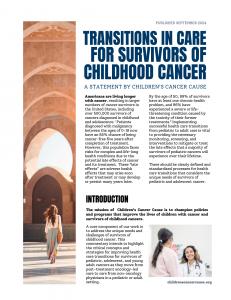Children’s Cancer Cause Calls for the Successful Transition of 500,000 Childhood Cancer Survivors in the U.S.
Nonprofit's statement proposes recommended actions to improve health care transitions for survivors of childhood, adolescent, and young adult cancers.
WASHINGTON, DC, UNITED STATES, September 26, 2024 /EINPresswire.com/ -- Children’s Cancer Cause, a national patient advocacy organization, today called on the greater healthcare system and provider community to work toward the successful health care transition of more than 500,000 childhood cancer survivors, a growing population with unique long-term care needs. The call to action coincides with the release of the statement Transitions in Care for Survivors of Childhood Cancer1.
“The growing number of survivors of childhood and adolescent cancers coincides with an increase in the number of those facing risks for serious and lifelong health conditions, due to potential late effects,” said Katie Devine, PhD, MPH, Chief, Section of Pediatric Population Science, Outcomes, and Disparities Research, Rutgers Cancer Institute.
Dr. Devine is one of the experts on the Children’s Cancer Cause Survivorship Advisory Council, which developed the statement that advocates for greater implementation of available post-treatment long-term follow-up guidelines and adoption of survivorship programs.
Among the statement’s recommendations is a call for the development of a consensus process to determine best practices and standards of care for effective healthcare transitions for survivors of childhood and adolescent cancers. Children’s Cancer Cause advocates for a similar process as developed for the long-term follow-up guidelines by the Children’s Oncology Group (COG), as these provide details for standards and practices from which to build effective models.
Transitions in Care for Survivors of Childhood Cancer cites studies that define transitions from pediatric to adult care as a systematic, structured, gradual process of moving from a child/family-centered model of care to an adult/patient-centered model of care.
Given the special needs of this population, the healthcare system needs to be better equipped to handle screening, cancer recurrence, and secondary cancers as part of late effects monitoring.
“Many healthcare providers who are treating survivors outside of survivorship programs are not familiar with, or are not trained in, the consequences of pediatric cancer and its treatments, nor are they aware that guidelines are publicly available,” said Mary McCabe, RN, MA, an international expert on cancer survivorship and Children’s Cancer Cause board member. "Most parents of children and adolescents cannot recall a detailed treatment history or a survivorship care plan that is required to inform optimal, long-term follow-up care. Too often, these families were not sufficiently educated about their risk of myriad late effects at the end of their treatment.”
The organization urges providers to take immediate steps to improve widespread use of comprehensive survivorship care plans as tools for specific patient-level care, utilize existing patient-centered tools such as Passport for Care and SurvivorLink, and raise awareness among survivors, caregivers, and non-oncology health care providers regarding availability and use of these tools.
Children’s Cancer Cause has long advocated for a transition model of care that could be tested and implemented through Medicaid and provide a demonstration for a more pervasive program, and the organization continues to pursue such a model as described in the statement.
In publishing the statement, the organization recognizes that a systemic approach to developing survivorship models of care is needed to address future needs, and effective transitions to pediatric or adult care by non-oncology health care providers is essential.
“Key stakeholders should undertake a consensus process to determine best practices and standards of care for effective healthcare transitions for survivors of childhood and adolescent cancers, including development of effective implementation strategies,” said Susan Weiner, PhD, Founder of Children’s Cancer Cause.
The statement is available at childrenscancercause.org/transitions2.
Steve Wosahla
Children's Cancer Cause
+1 202-552-7392
email us here
1 https://www.childrenscancercause.org/transitions
2 https://www.childrenscancercause.org/transitions

